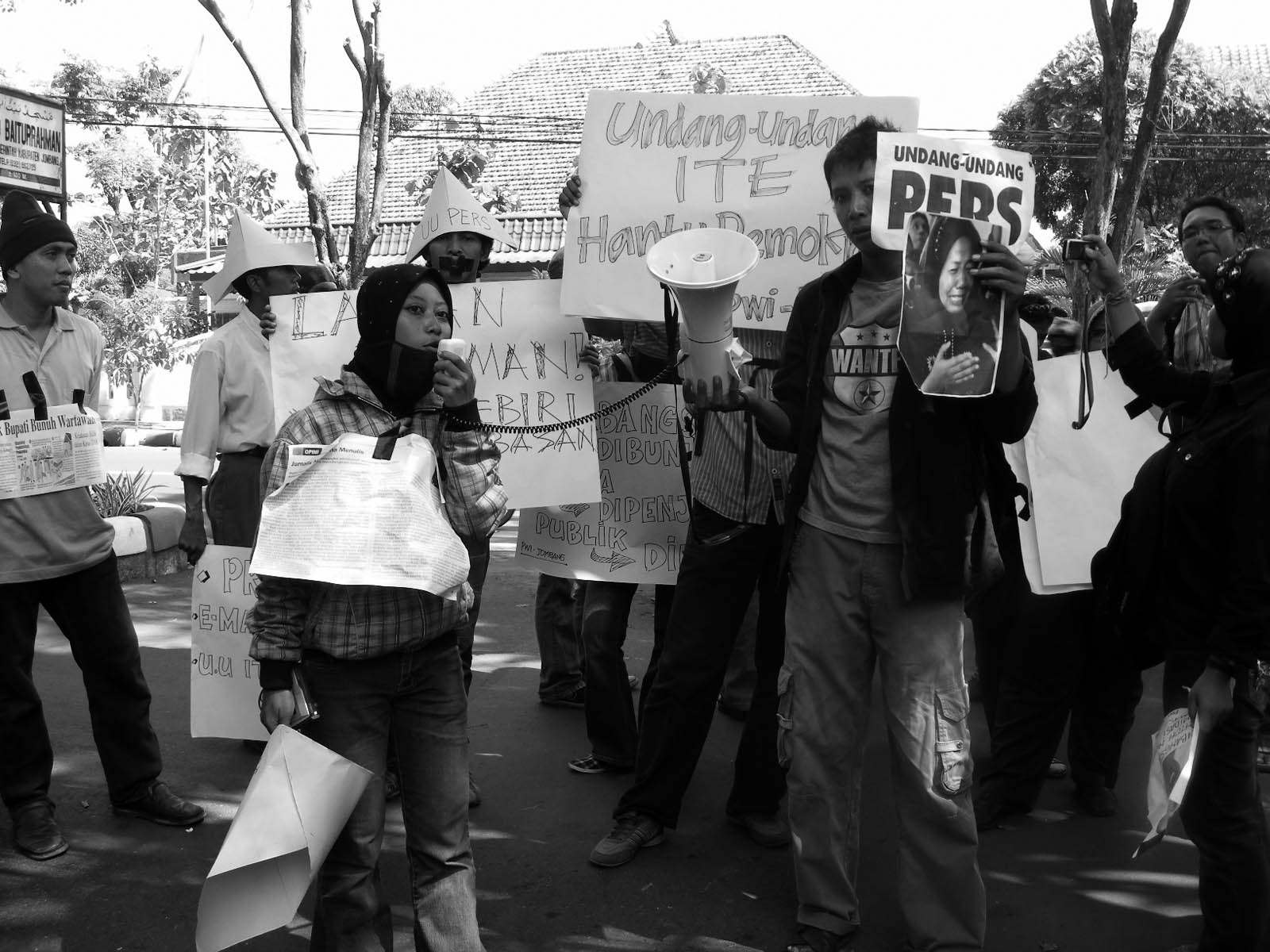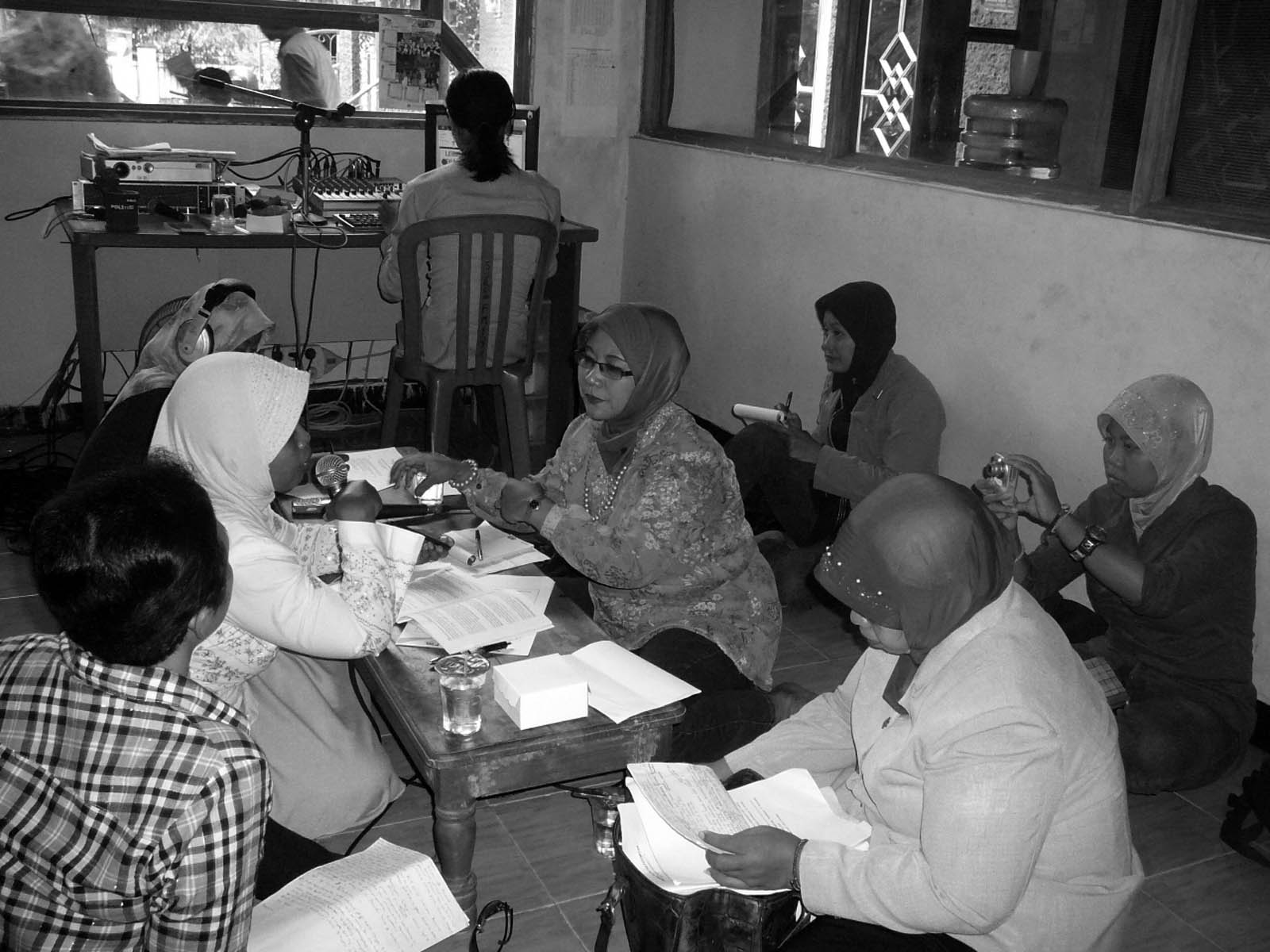
Women Rising the Quest for Space in Community Radio
The involvement and participation of women in the community radio station Suara Warga in Jombang was very minimal at first due to the reality that the domestic activities of many women take up most of their time, leaving them with little opportunity to take an active part in community media. Similarly, women broadcasters encounter several problems in their practice, such as constraints of broadcast time, the lack of self-confidence to broadcast, and the tendency to be regarded as inferior to men in the public domain. In response to these issues, the radio managers of Suara Warga sought to develop programs aimed at increasing the access and participation of women in radio. As a first step, Suara Warga conducted a gender audit and implemented affirmative action so that women and men have equal access and representation on the radio.
Developments surrounding women’s increased participation in Suara Warga are evident in the internal workings of the station. Women staff members are prioritised when conducting training or focus group discussions (FGD) with radio stakeholders — people from the government, NGOs, media networks, and community organisations who invite our station to discuss these issues with them. A gender policy in Suara Warga was implemented through the enforcement of an organisational structure designed to ensure gender balance within in the station. As such, policies that support women’s involvement in radio, including one that requires every woman staff member to know how to operate the broadcasting and production equipment such as mixers, computers, microphones and receivers so they will not depend on male staff members were implemented. The station also manages a radio program that provides a space to discuss a variety of gender issues in relation to social, economic, political, cultural contexts at the local, regional and international levels.

Radio Suara Warga).
Photo courtesy of Noor Chasanah
Female broadcasters now actively and equally communicate with male broadcasters, especially in terms of management, decision making and radio production. There are also more women broadcasters in the station’s management and executive positions for radio programmes. Also, almost all women broadcasters in the station are capable of working at all levels and positions — as announcers, reporters, treasurers, program manager. Women are also encouraged to take positions in human resources and staff development, marketing and network development.
From the perspective of outsiders, women broadcasters have also shown a lot of progress. The experience of Eka Rimawati, a female reporter, highlights this. Initially, when she needed to look for news stories and interview a speaker from the government office, she did not believe in her abilities as a reporter because she was a woman. She felt that she always had to prove to all her interviewees that she was just as talented and professional as any of the male reporters. This changed after attending a training where she gained valuable experience in journalism- which she shared with other women journalists. Because of the positive results brought about by her participation in the workshop, Eka is now trusted when conducting interviews and news coverage by a variety of sources.
A gender policy in Suara Warga community radio was implemented through the enforcement of an organisational structure designed to ensure gender balance within in the station.
The impact of the implementation of the gender equity policy is much felt by women broadcasters at Suara Warga. For example, women get balanced positions and opportunities in radio management. Every announcer, regardless of their gender, has an equal right to give their opinions and ideas in all decision making processes. Women broadcasters are also able to participate in all managerial activities of the community radio station. Moreover, communication among the crew has become more open with everyone being free to express themselves without causing any insults.
The implementation of a gender policy has further strengthened the motivation and ability of the women’s movement to voice their aspirations through the community radio. It has also helped strengthen the commitment of the crew of Suara Warga in developing radio programs discussing women’s issues such as violence against women, sexual harassment, trafficking, and reproductive health-to name but a few. Suara Warga hopes that the continued implementation of the gender policy guidelines will be able to encourage more women not only from the local communities, but the whole of Indonesia to challenge patriarchal institutions in this country.

Photo courtesy of Noor Chasanah
Currently, Suara Warga has a special programme on women called “Women Voices.” Through the programme we invite women leaders or activists from both the domestic and public domains to be resource persons in the program sharing their perspectives and stories. Many of the women who are invited to the show are empowered and successful women who participate in critical dialogue about women’s issues. The program was created specifically to address women’s issues such as domestic violence, gender equality, reproductive health, trafficking and HIV/AIDS. The listeners of “Women Voices” welcome the special programme and actively participate via phone or text messages. “Women Voices” also has many male listeners who openly give their opinions about the issues being discussed in the programme. Such programmes have been both enriching and encouraging to the general public as it has been able to increase women’s participation in media as well as foster a better understanding of gender equality and justice in all aspects of life (social, economic, political and cultural).
The programme has been well received by the public. For example, when ”Women Voices” invited Afif Fatinnur, a community organiser, to share her experiences in assisting pedicab drivers and garbage collectors (many of who were mostly men) the show got a lot of positive feedback from its listeners. Some listeners gave comments about the important role of women in community organising, while others expressed their admiration for what Afif has done for her community. There was also a listener from an organisation working with the disabled who expressed hope that Afif and her organisation would assist them in making their issues more visible to encourage government responses. The listeners implicitly acknowledged that women also have the capacity to provide assistance in the community. This counters the dominant public opinion that only men are able to perform these roles.
Along with the development of new ICT, women broadcasters at Suara Warga have also actively participated in expanding their network by sharing information through Facebook, Twitter, mailing lists and other social networking tools. These tools help women broadcasters share and get vital information more efficiently.
Women broadcasters at Suara Warga also use new ICTs to develop women’s networks at the local level (for example, Women’s Crisis Center, the rural women's organisation), at the national level (such as National Commission for Women, Women’s Solidarity). Additionally, we also work with other networks and women’s organisations at the international level (AMARC WIN, Isis International). Development of these networks further strengthens the voice of women’s issues and enhances mutual support among women’s organisations and networks in campaigning for women’s rights and ending violence against women.





 The
The 
 Isis Resource Center holds one of the largest feminist collections of materials in the Global South. With 40 years of publication experience, Isis holds a vast collection.
Isis Resource Center holds one of the largest feminist collections of materials in the Global South. With 40 years of publication experience, Isis holds a vast collection.